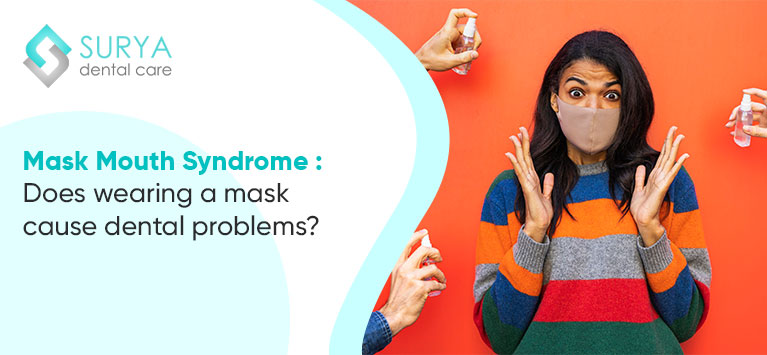In our ever-evolving world, the COVID-19 pandemic has introduced a new norm – mask-wearing. While masks are essential for reducing the spread of the virus, a peculiar oral health concern has emerged in tandem with their prolonged use: Mask Mouth Syndrome. As a result of this event, the question, “Does wearing a mask cause dental problems?” arises.
This article will examine potential dental problems brought on by extended mask use and provide helpful advice for preserving oral health.
Mask Mouth: A Dental Dilemma
Defined as “Mask Mouth,” this condition can affect individuals who wear a mask for extended periods, alongside ‘maskne,’ a specific type of acne that primarily impacts the skin of the cheeks and chin, often exacerbated by mask usage, particularly in warm weather.
Mask mouth is a colloquial term that refers to a number of conditions, including dental decay, dry mouth brought on by mouth breathing, bleeding gums, bad breath, receding gums, and receding gums. Especially if they use their masks often, mask wearers may encounter one or more of these symptoms.
Mask mouth results from wearing a mask for an extended period of time, keeping your mouth sealed behind a fabric mask, and inhaling more via your mouth than your nose. Your breath begins to smell as your mouth dries out, and your teeth begin to deteriorate.
Because saliva is essential for maintaining excellent oral health, having a dry mouth may cause your teeth to get damaged. Even though mask mouth symptoms by themselves are not harmful, when combined, they can have a negative long-term effect.
What oral problems can using the mask cause?
Some bacteria are naturally present in the oral cavity that are stimulated by the lack of oxygen, even though the mask has no direct impact on the development of bacterial plaque or other oral health issues. The impact of these bacteria on dental health may be triggered by wearing the mask for an extended period.
The lower exposure to the air that the mouth encounters with the mask, the accumulation of saliva and food remains, aggravated by the neglect of oral health, could cause some problems already beginning to be detected in those people who use it in their day-to-day lives.
Dry mouth
The fact that water is the essence of life is a universally accepted truth, given its indispensable role in nearly all our bodily systems. Hydration’s importance extends to our oral health as well. It serves as a custodian of oral equilibrium, preventing unpleasant breath and promoting a cleaner mouth, among other benefits.
Wearing a mask causes breathing more through the mouth than through the nose and can even influence us to drink less water because we wear it for a long time. All of this can cause greater dryness in the oral cavity.
Halitosis
Bad breath is one of the first problems derived from the use of a mask. Throughout the day, the mouth accumulates remains of food, tobacco, coffee, and other elements that favor the development of bacteria, causing bad breath. Halitosis can come from a previously present health problem, which becomes more evident when covering the mouth with the mask, or be caused by the bad odor that it retains over time.
It’s crucial to remember that the mask should be replaced every 4 to 6 hours, varying according to the specific model, to ensure its continued effectiveness and prevent the build-up of saliva or dirt. Strict adherence to the manufacturer’s usage guidelines is essential. Additionally, combatting dry mouth is a highly practical approach to resolving issues related to unpleasant breath odor.
Cavities
The mask acts as a barrier, so that many people end up neglecting oral hygiene. The frequency of teeth cleaning should be increased to avoid the appearance of cavities, as well as other common oral diseases.
Along with oral hygiene and the use of appropriate accessories and products, check-ups by a dental professional remain vitally important to protect teeth and gums.
Increase in the incidence of oral diseases.
With the arrival of masks, and added to the other health measures implemented during the pandemic, many people have chosen to postpone their visit to the dental clinic “until the situation improves.”
The problem is that our mouth does not wait, and periodic check-ups are essential if we want to detect problems in time and avoid major complications. Generally, early detection allows for less invasive treatments and a lower investment of time and money.
Practical Recommendations for Dental Health
To combat Mask Mouth Syndrome and ensure your oral health remains intact, consider these recommendations from dental experts:
Daily Oral Care:
Maintain optimal oral health through the practice of brushing your teeth at least twice a day, using toothpaste with fluoride, and integrating interdental brushes, dental floss, and mouthwash into your daily regimen.
Evening Dental Maintenance:
Prioritize your teeth’s cleanliness before going to bed to inhibit bacterial growth during the night.
Regular Mask Maintenance:
Change or wash your mask daily to prevent saliva and dirt accumulation, and follow the manufacturer’s instructions for proper use.
Hydration:
Drink plenty of water all day to prevent dry mouth. A healthy oral flora may be maintained, and breath can be made fresher by drinking water.
Healthy Diet:
Consume a balanced diet and avoid snacking between meals. Opt for healthier snacks over sugary ones to protect your teeth.
Toothbrush Replacement:
Change your toothbrush every 2 to 3 months to ensure effective cleaning.
Dental Check-ups:
Don’t postpone dental visits; regular check-ups are vital for detecting and addressing potential issues promptly.
In conclusion, while mask-wearing is crucial for curbing the spread of COVID-19, it’s essential to be mindful of its potential impact on oral health. Mask Mouth Syndrome, characterized by dry mouth, bad breath, cavities, and increased incidence of oral diseases, can be mitigated with proper oral hygiene and maintenance. By following these practical recommendations, you can protect your dental health while continuing to prioritize safety in these challenging times.



